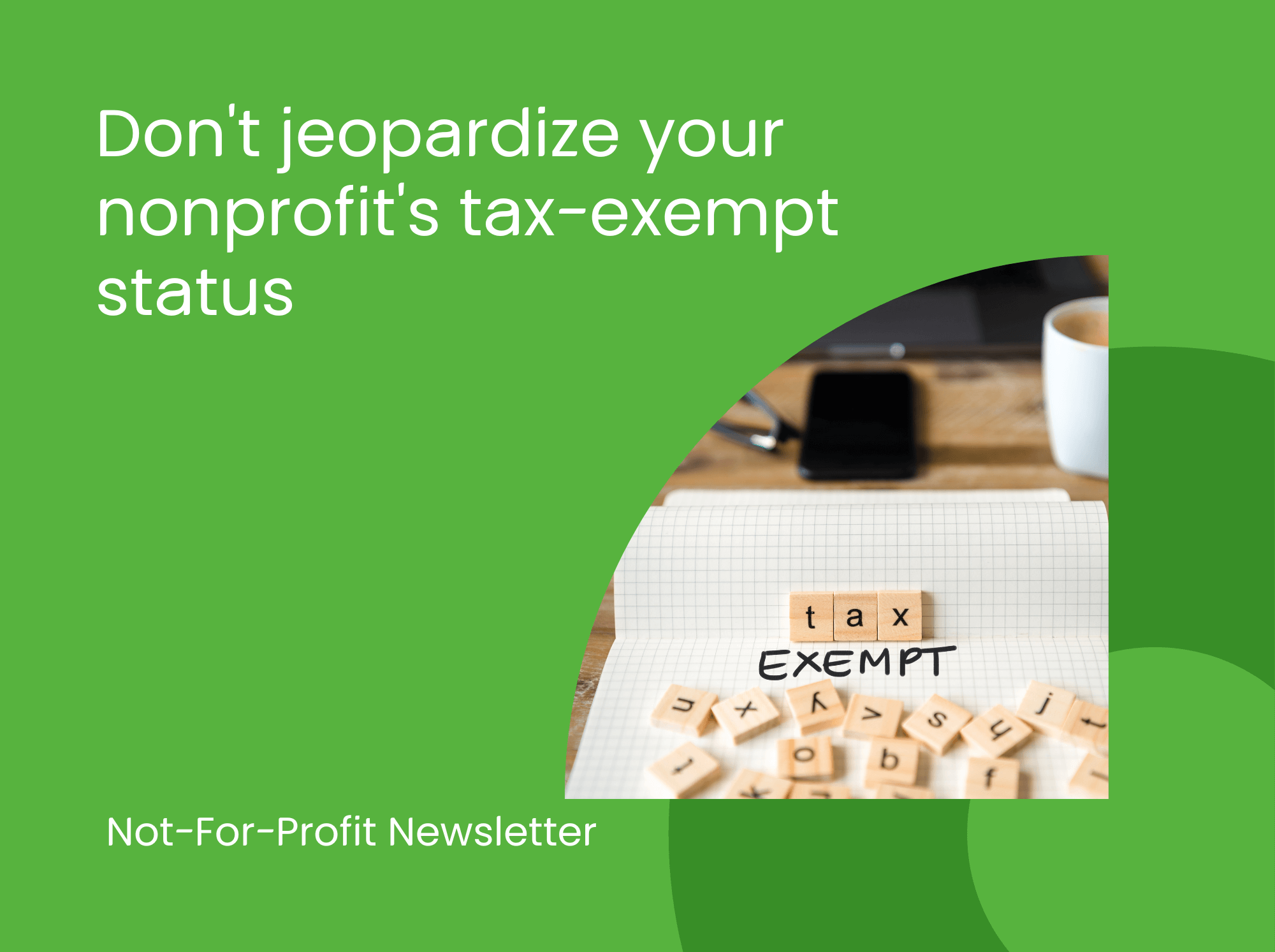There’s a common misconception that not-for-profit organizations are strictly banned from lobbying for a political, environmental or some other social issue.
Organizations aren’t banned from such activities, but there are potential pitfalls to avoid and not-for-profits must operate within certain boundaries. A single misstep could result in severe consequences — including the loss of a tax-exempt status.
Legislation Defined
 Generally, a not-for-profit may no longer qualify for tax exemption if a substantial part of its activities is attempting to influence legislation. The definition of legislation is complex. According to the IRS, legislation includes:
Generally, a not-for-profit may no longer qualify for tax exemption if a substantial part of its activities is attempting to influence legislation. The definition of legislation is complex. According to the IRS, legislation includes:
- Any action by Congress or any state legislature, local council or similar governing body regarding acts, bills, resolutions or similar items, or
- Acts by the public in referendum, ballot initiative, constitutional amendment or similar procedure.
Legislation doesn’t include, however, actions by executive, judicial or administrative bodies.
The substantial threshold is open to interpretation. There’s no bright-line test to follow. For example, when a tax reform debate broils though Washington, DC, not-for-profits can’t rely on definitive guidelines for being treated as lobbyists. But this much is clear: An organization will be regarded as attempting to influence legislation if it:
- Contacts, or urges the public to contact, members or employees of a legislative body for the purpose of proposing, supporting or opposing legislation, or
- Advocates the adoption or rejection of legislation.
Nevertheless, not-for-profits may be involved in public policy issues without the activity being considered lobbying. For instance, a not-for-profit might conduct educational meetings, prepare and distribute educational materials, or otherwise consider public policy issues in an educational manner without jeopardizing its tax-exempt status.
In sum, whether a particular action or communication is an attempt to influence legislation is determined by all the facts and circumstances.
In addition to direct appeals to legislators, communications to the public that refer to specific legislation and urge people to take action are characterized as “grassroots lobbying.” For example, a not-for-profit may encourage its members to contact someone connected with a legislative body to support or oppose a particular issue. This is treated as a grassroots lobbying communication. Similarly, an organization that encourages its members to urge nonmembers to contact legislators is deemed to have engaged in grassroots lobbying.
Permissible Activities
Be aware that certain types of activities aren’t treated as lobbying. For instance, if you give testimony before a legislative committee in response to an official request for such testimony, it’s not considered an attempt to influence legislation. Likewise, providing access to the results of nonpartisan analysis, study or research to a legislative body or the general public isn’t lobbying.
Another key exception: The tax law allows an organization to defend itself without being characterized as lobbying. As a result, appearing before or communicating with a legislative body concerning possible legislation that could affect the not-for-profit’s existence, powers and duties, tax-exempt status, or the deduction of contributions isn’t deemed to be an attempt to influence legislation.
The IRS often focuses on two critical factors in determining whether a substantial part of an organization’s activities is devoted to lobbying:
- The time devoted by employees and volunteers of the organization, and
- The amount of expenses incurred.
Keep in mind, however, that these aren’t the only two factors that may come into play. Furthermore, there’s no definitive percentage of either activity to determine when participation is substantial. Therefore, again, whether and when an organization crosses the substantial threshold depends on the facts and circumstances.
Another important issue in trying to determine whether attempts to influence legislation are substantial is determining what supporting activities are included as lobbying activities. A significant amount of time and effort may be devoted to researching and studying an issue before the organization’s position is even established. This isn’t lobbying.
Making the Special Election
Because of the inherent difficulty in determining the substantial threshold, organizations that engage in more than casual lobbying efforts may choose to be bound by a special lobbying election.
Most public charities and 501(c)(3) entities can make the election, but not private foundations and churches and their integrated auxiliaries. These rules provide precise standards for determining whether legislative activities are substantial or not. By making the election, an organization can engage in attempts to influence legislation without jeopardizing its tax-exempt status.
Although these rules are complex, here’s a brief overview of the guidelines:
- An organization is permitted total annual lobbying expenditures up to a specified percentage of its tax-exempt purpose expenditures. The applicable percentage is 20% of the first $500,000 of expenditures, but this percentage is reduced with each successive tier of expenditures.
- Regardless of the amount of tax-exempt purpose expenditures, the total amount spent for legislative activities in a single year can’t exceed $1 million.
- A separate limit is imposed on grassroots lobbying expenditures. It’s equal to 25% of the organization’s lobbying nontaxable amount. The nontaxable amount for any year is a maximum of $250,000.
- Lobbying expenditures exceeding the permissible amounts are subject to an excise tax and can cause the loss of tax-exempt status.
Just Be Mindful
As you can see, the lobbying rules for charitable organizations are extensive. However, it’s clear that an organization can still actively support or oppose legislative efforts if it adheres to the IRS guidelines. Be mindful of the rules as your nonprofit advocates for or against tax reform or some other hot-button issue.
Copyright © 2022



